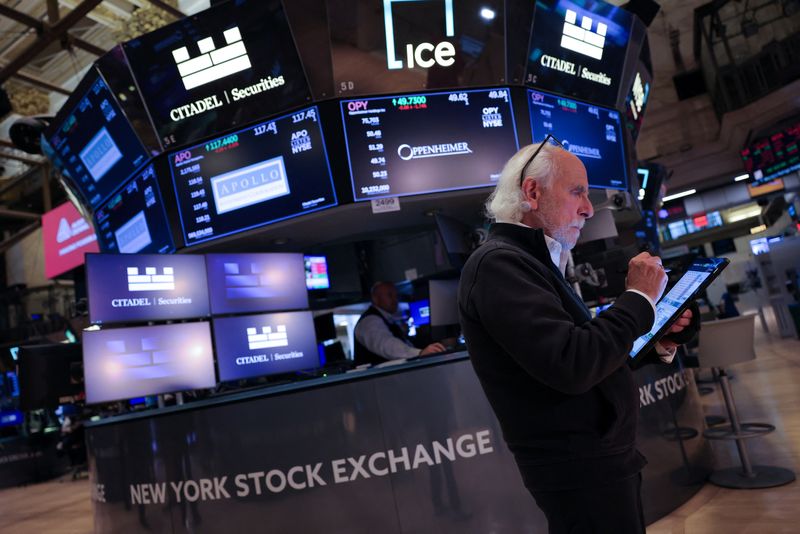S&P 500 surges to record high close on euphoria over Fed rate cut
By Noel Randewich and Purvi Agarwal
(Reuters) -The S&P 500 surged to a record high close on Thursday, the day after the Federal Reserve cut interest rates by 50 basis points and indicated more rate cuts were on the horizon.
Heavyweight stocks that have enjoyed much of this year's stock market rally made fresh gains, with Tesla (NASDAQ:TSLA ) surging over 7%, and Apple (NASDAQ:AAPL ) and Meta Platforms (NASDAQ:META ) each up almost 4%.
AI powerhouse Nvidia (NASDAQ:NVDA ) jumped 4%, helping lift the PHLX semiconductor index surge 4.3%.
Better-than-expected jobless claims data further stoked global risk appetite.
On Wednesday, the Federal Reserve announced a rate cut at the high end of expectations, and said it had greater confidence inflation was under control. Fed Chair Jerome Powell said the U.S. economy remained strong and the central bank would decide on the appropriate pace of future rate cuts.
"The Fed has sanctioned a pretty strong economic picture here, and so we're just seeing the money flow back into some of the sectors that have perhaps underperformed so far this quarter," said James Ragan, Director of Wealth Management Research at D.A. Davidson.
The small-cap Russell 2000 index rose 2.1% as lower interest rates boosted prospects of reduced operating costs and greater profits.
The S&P 500 climbed 1.70% to end the session at 5,713.64 points, its highest close ever. The Nasdaq gained 2.51% to 18,013.98 points, while the Dow Jones Industrial Average rose 1.26% to 42,025.19 points, its highest close ever.
Of the 11 S&P 500 sector indexes, eight rose, led by information technology, up 3.08%, followed by a 2.2% gain in consumer discretionary.
In extended trade, Fedex dropped 10% after the company cut its revenue target for its fiscal year 2025.
BofA Global Research said it now expects a total of 75 basis points in rate cuts by the end of this year, steeper than its previous forecast of 50 bps.
Evercore ISI data going back to 1970 showed the S&P 500 has posted an average 14% gain in the six months following the first reduction of a rate-cutting cycle.
September has generally been a disappointing month for U.S. equities with the S&P 500 notching an average loss of 1.2% since 1928.
The S&P 500 banks index rose 2.5%, with gains in Citigroup and Bank of America after they lowered their respective prime rates.
Fertility benefits management firm Progyny (NASDAQ:PGNY ) plunged 33% after a significant client notified the company it had elected to exercise a 90-day option to terminate its services agreement.
Advancing issues outnumbered falling ones within the S&P 500 by a 2.4-to-one ratio.
Across the U.S. stock market, advancing stocks outnumbered falling ones by a 3.8-to-one ratio.
Volume on U.S. exchanges was relatively heavy, with 12.3 billion shares traded, exceeding the average of 10.8 billion shares over the previous 20 sessions.
Source: Investing.com
